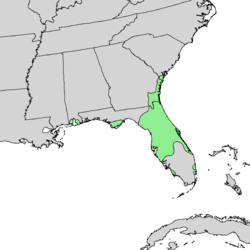From Wikipedia
Open on Wikipedia
| Chapman oak | |
|---|---|

| |
| Scientific classification | |
| Kingdom: | Plantae |
| Clade: | Tracheophytes |
| Clade: | Angiosperms |
| Clade: | Eudicots |
| Clade: | Rosids |
| Order: | Fagales |
| Family: | Fagaceae |
| Genus: | Quercus |
| Subgenus: | Quercus subg. Quercus |
| Section: | Quercus sect. Quercus |
| Species: | Q. chapmanii
|
| Binomial name | |
| Quercus chapmanii | |

| |
| Natural range of Quercus chapmanii | |
| Synonyms[3] | |
| |
Quercus chapmanii, commonly referred to as the Chapman oak, is a species of oak that grows in the southeastern United States.[4]
Description
[edit]Quercus chapmanii is a shrub or small tree occasionally reaching a height of 6 meters (20 feet) but usually less. Leaves sometimes have no lobes, sometimes wavy rounded lobes.[5][6][7]
Distribution
[edit]Quercus chapmanii is found in the states of Alabama, Florida, Georgia, and South Carolina.[5]
References
[edit]- ^ Kenny, L.; Wenzell, K. (2015). "Quercus chapmanii". IUCN Red List of Threatened Species. 2015 e.T72420232A72420970. doi:10.2305/IUCN.UK.2015-4.RLTS.T72420232A72420970.en. Retrieved 20 November 2021.
- ^ a b "Quercus chapmanii". NatureServe Explorer. Retrieved 4 September 2025.
- ^ "Quercus chapmanii Sarg.". Tropicos. Missouri Botanical Garden.
- ^ Duncan, Wilbur H.; Marion B. Duncan (1988). Trees of the Southeastern United States. Athens, Georgia: The University of Georgia Press. pp. 229. ISBN 0-8203-1469-2.
- ^ a b NRCS. "Quercus chapmanii". PLANTS Database. United States Department of Agriculture (USDA). Retrieved 2 January 2010.
- ^ "Quercus chapmanii". Native Plant Database. Lady Bird Johnson Wildflower Center, University of Texas at Austin. Retrieved 2 January 2010.
- ^ Nixon, Kevin C. (1997). "Quercus chapmanii". In Flora of North America Editorial Committee (ed.). Flora of North America North of Mexico (FNA). Vol. 3. New York and Oxford: Oxford University Press – via eFloras.org, Missouri Botanical Garden, St. Louis, MO & Harvard University Herbaria, Cambridge, MA.
External links
[edit]Wikimedia Commons has media related to Quercus chapmanii.
- photo of herbarium specimen at Missouri Botanical Garden, collected in Florida circa 1860
- Maps Educational Technology Clearinghouse, Produced by the Florida Center for Instructional Technology, Map showing distribution in Florida (with parts of Alabama and Georgia)
- Pollen Library[permanent dead link]

